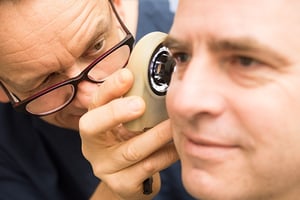What is dermoscopy? Key facts about professional skin checks.
With more than 750,000 skin cancers being diagnosed in Australia every year, it is very important that we all undergo professional skin checks at least every 12 months. Skin cancers can develop rapidly and often show no symptoms until an advanced stage, so while at-home monitoring is important for tracking changes in our spots, the best way to detect skin cancer early is to regularly see a doctor for a check-up.
 So what tools do skin cancer doctors use to identify cancerous spots? The most common and effective tool is called a dermatoscope. During a full-body skin check, the doctor will closely examine any unusual spots using a tool that resembles a flashlight with a magnifying glass attached to the end. Dermatoscopes offer a close-up perspective to "see through" the top layer of skin and help the doctor to assess whether a mole is normal or abnormal.
So what tools do skin cancer doctors use to identify cancerous spots? The most common and effective tool is called a dermatoscope. During a full-body skin check, the doctor will closely examine any unusual spots using a tool that resembles a flashlight with a magnifying glass attached to the end. Dermatoscopes offer a close-up perspective to "see through" the top layer of skin and help the doctor to assess whether a mole is normal or abnormal.
The unique view allows the doctor to assess what is happening to the skin cells that are otherwise invisible to the naked eye. The doctor can identify unusual early activity in the skin cell patterns and provide an early skin cancer diagnosis – often before a spot starts to look unusual on the surface.
This field of skin cancer medicine is called dermoscopy. The imaging system is completely painless and non-invasive, and has been proven to increase the rate of skin cancer detection. The doctors at National Skin Cancer Centres are expertly trained in dermoscopy, which has now become the world standard in early skin cancer diagnosis.
Skin cancer doctors may also use high-resolution imaging to photograph suspicious spots during your skin check. These images are used to study your spots in more detail and record them for future skin checks. The doctor can then compare the lesions to past photographs and identify any changes which could indicate skin cancer.
Early detection of skin cancer is crucial to prevent disfigurement or even death. Dermoscopy is a very important tool in detecting cancers before they become dangerous, as no mole is left unexamined.
The doctors at National Skin Cancer Centres have expert training with state-of-the-art technology, giving you the peace of mind that your skin cancers will be found and treated at the earliest stage.
- Tags:
- Detection
